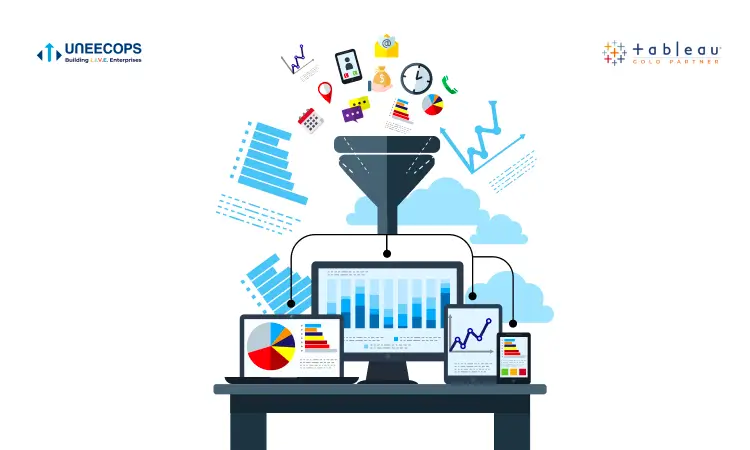MDM, which stands for Master Data Management, is the process of integrating multiple data sources into a single, unified source with extreme precision. In the digital era, businesses across industries rely solely on their existing data to identify future trends and demands. Therefore, the benefits of master data management are immense as it maintains the authenticity of the flowing data.
Master data management features include resolving data discrepancies and integrating multiple data sources into a single, unified master source. Apart from this, numerous other benefits of master data management can’t be ignored by a business.
What Is Master Data?
There are mainly three types of enterprise data. One kind is that data which tells us about the transactions (Sales, Purchase, etc.). These are called transactional data. Based on the sales, Purchase, and other data, we create analytical insights. Data that is related to these analytical insights is called analytical data.
Both the above kinds of data have different contexts. For example, when we sell something, that data is recorded in the context of selling a specific product to one particular customer. This contextual data is what we call the Master Data. It is the data of the products, location, staff, vendors, and every other data upon which transactional and analytical depend. For example, without the data of products, you can’t create sales data as you can’t associate the transaction with any product. Thus, Master Data is the backbone of the enterprise data.
What Is Master Data Management?
Master Data Management or MDM is the process of storing the mission-critical enterprise data in a centralised form. The IT department needs to work closely with the business to first identify the Master Data, and only then this data can be stored in an efficient manner. Master Data Management is not just dumping the critical data in a centralised storage system. Master Data Management solutions entail proper categorisation of data. One Master Data can have multiple sub-domains. For example, while creating an item Master Data for a manufacturing plant, there can be two types of items- raw materials and finished goods.
Granularity is the keyword in Master Data Management. There can be a lot of conditional logic when it comes to Master Data creation. For example, both items and their price fall under the purview of Master Data. However, one item can have multiple prices depending upon how much quantity of that item is being bought.
There are various Master Data Management tools that the IT department uses to store and organise Master Data. Sometimes ERP systems are used to store Master Data.
Beyond Data Silos: Why MDM is Essential for Success in 2025
- Establishing a foundation of trustworthy data for compliance and analytics
An important benefit of master data management is its capacity to eliminate any data inaccuracies and inconsistencies. The major purpose of master data management is to make a single, consistent, and standard flow of data for improving data management and its accuracy. These master data management features ensure that companies get the most purified and high-quality data at their disposal. This can be used by companies to make data-driven decisions, predict future trends, and optimize performance.
- Mitigating risks with robust security measures and regulatory compliance
Efficiently complying with regulations and ensuring data security are other great advantages of master data management. The MDM makes sure that there are no data breaches and that it is complying with the regulations. It helps the companies create accurate data records and protect highly sensitive data by strengthening data protection. Overall, the benefits of master data management in maintaining security and data compliance cannot be overlooked.
- Reducing bottlenecks and accelerating operations for higher output
Another master data management business benefit is its capacity to greatly improve business operations by streamlining data processes for greater accuracy. Modern master data management features include advanced AI-driven automated data insights that enhance supply chains and reduce any risks of human error by automating repetitive tasks. Not only this, but the benefits of master data management also extend to processing large datasets in real time and providing accurate data insights. Companies can use this data to make crucial business decisions and can plan their future business plans accordingly.
- Creating meaningful connections through tailored interactions and support
Master data management business benefits also include increasing and growing customer relationships as it can identify customer purchasing patterns and choices. Businesses can reap the maximum benefits of master data management by using their customer data insights to create personalized marketing campaigns for greater impact. Also, having access to accurate and consistent data helps businesses deliver their products or services on time, which helps improve customer relations. This leads to higher customer retention rates and long-term growth of the business.
- Driving higher ROI through smarter resource allocation and cost optimization
A few other important benefits of master data management include the reduction of operational costs and higher ROI. MDM integrates high-quality data and eliminates unwanted and inaccurate data to boost performance. This leads to lower disruptions or errors in businesses, helping them to save a lot of costs in operations. Overall, it has been already established that a company reaping the benefits of master data management enjoys long-term growth and higher ROI.
Master Data Management Reimagined: What’s Next in the Digital Age?
- AI in MDM
MDM is going through an AI revolution right now. The introduction of AI has drastically improved its accuracy and performance. Now, it can clean data and perform a classification automatically without needing any manual intervention. Also, AI provides real-time data insights and analysis that are extremely accurate and reliable for making tough business decisions. Meanwhile, AI also helps to reduce manual input by automating various tasks, thus protecting the entire workflow from any human error.
- Cloud-based MDM Solutions
The introduction of cloud-based MDM has been a great boon for smaller businesses with limited resources. Now, even the newer startups can reap the master data management benefits by purchasing a cloud-based MDM subscription. With time, this trend of adoption of cloud technology is only going to be in higher demand because it’s very cost-effective and doesn’t require any on-site investment.
- Data Governance and Privacy
MDM has strong and reliable data management features that comply with all types of regulations and laws. It reduces the risks of any data leaks and helps protect sensitive data from any cyber-attacks. Businesses with higher data security can project themselves as more credible and reliable organization to their customers and win their confidence.
Final Words
The benefits of master data management massively outweigh the initial cost of investment. It maintains strict data privacy, ensures accuracy and consistency of data, and provides real-time data insights. Businesses can make use of these advanced master data management features to scale their business by making data-driven decisions. MDM is a much-needed asset for any business that has the intention of becoming highly competitive and growing for the long term without any hurdles.







